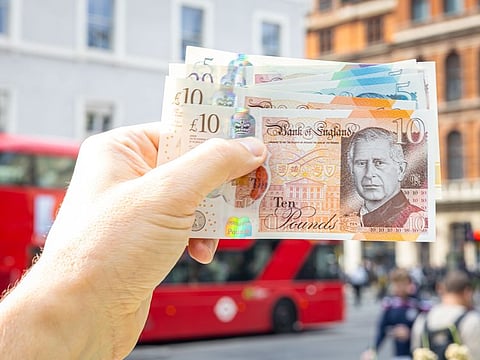Pound vs Euro: UAE money transfers - time it right in July, save big on remittances
Sending money home from Dubai? Get the best exchange rate, here's how to

Dubai: Thinking of sending some cash to the UK or anywhere in Europe? Hold on to your dirhams! Just like booking a flight, timing your money transfer can save you some serious money.
The first step is figuring out if the currency in the country you are remitting to is going to rise or fall in value soon? This can make a big difference in how much money your friends or families end up receiving after you send.
Gulf News analysed currencies like the British pound and the euro to see if a money transfer now is a win or a wait-it-out situation. While these currencies are less prone to fluctuations than some South Asian ones (think Indian rupee, Pakistani rupee, and Philippine peso), even small changes can add up to big savings when you're sending a hefty chunk of change.
Weakening currency? Wait for the drop! If your home country's currency is taking a tumble, sit tight! The exchange rate will get better as it weakens, so you can send more money later.
Currency on the rise? Send now and save! On the flip side, if your home turf's currency is getting stronger, don't delay! The exchange rate will only go up, so remitting now saves you money in the long run.
British pound to get stronger, remit now!
“The British pound (GBP) or Sterling’s exchange rate has been largely unchanged since the year began, which would have steadily discouraged remittances and overseas transactions,” explained Amit Trivedi, UAE-based forex analyst and trader.
“However, the pound to US dollar exchange rate has bottomed out, which will soon cause it to rise in value. This will reflect against the UAE dirham as well. With a new Prime Minister elected in the UK, the pound will briefly stay remittance-friendly before it rises in the coming weeks.”
However, analysts are widely flagging that the pound will find less room to rise in value against the US dollar, as the dollar is seen largely unchanged now with the US central bank signalling lesser rate cuts in 2024. The pound is currently at 0.78 against the dollar.
“Similarly, against the UAE dirham, the pound value is seen rising slightly from its current level of 0.21, which implies that either you should remit now or postpone plans to when the value drops, to get more value for your dirhams when remitting overseas,” added Trivedi.
What does a strengthening pound mean for you?
As a strengthening pound won’t help remittances, the current levels are still favourable to those looking to remit. But what else does such currency weakness mean for your money? “With the British Sterling’s potential rise against the US dollar, investors will soon benefit when investing in UK shares or stocks, which are mostly dealt in the soon-to-be-weak US dollar,” noted Brody Dunn, an investment advisor at a global wealth management firm located in Abu Dhabi. “But those with savings in the UK might finally have something to smile about as cash deposits are finally beginning to pick up, albeit still well below the rate of inflation. As the central bank is yet to indicate whether or not the economic growth is still in a state of limbo, only time will give clarity on forex rates.”
How a slightly strong euro can affect UAE remittances
Against the US dollar, the euro exchange rate has dropped in value against the US dollar since the start of the year, but steadied last month in the run up to the European Central Bank’s meeting, explained Dunn. It is at 0.92 versus the US dollar currently.
“The decline of the euro at the start of this year has encouraged people to remit overseas. With the euro’s fortunes looking to change this month against the US dollar as the US won’t be cutting rates as fast as Europe, current remittance rates should be taken advantage of before they rise,” said Trivedi.
However, analysts also widely expect that the euro exchange rate won’t rise too much against the US dollar, particularly as ECB decided to cut rates last month. “ECB cutting interest rates sooner than the US Fed will widen the interest rate gap between the US and the Eurozone, putting reverse pressure on the Euro against the US dollar,” Trivedi added, which is in line with the recent forecasts from top investment banks worldwide as well.
“In other words, although the euro will edge up in value, gains will be restricted. This will be reflected against the UAE dirham as well. What this means to expats is that it is cost effective to remit now and take advantage of the current rates,” Trivedi added.
Bottom line?
“If you concern yourself with exchange rates when you’re about to head off abroad on holiday, bear in mind that changes to the currency’s value have wider ramifications beyond the price you’ll pay overseas,” said Anil Pillai, a UAE-based banking analyst specialised in forex payments.
“When it comes to remitting the euro or the British pound in July, trends are expected to reverse soon, so it would mean that it would be comparatively cost-effective to remit soon before rates rise. This should provide expats clarity on how they should plan their upcoming remittances.”
Sign up for the Daily Briefing
Get the latest news and updates straight to your inbox



